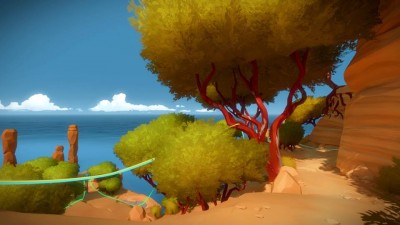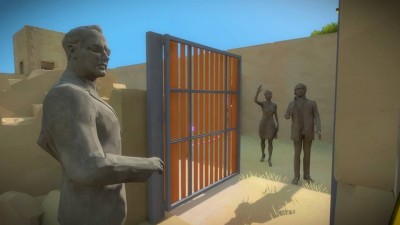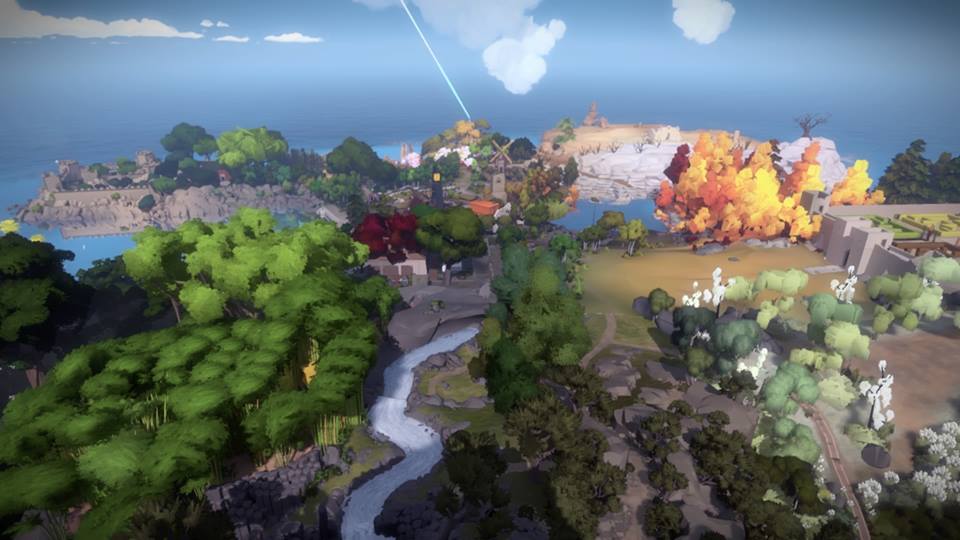Review: The Witness
Community
The Witness
Thekla, Inc.
Reviewed on: PS4
Also on: PC
Street: 01.26
I remember playing Myst with my dad when I was five years old. We sat together in the computer chair, wandering throughout this enigmatic island with only our wits and a strange book chronicling the history of the island’s inhabitants. More vividy than anything, I recall how validating it was to solve some of the more nefarious puzzles after struggling for what seemed like hours. When I heard that Jonathan Blow, developer of the 2008 hit Braid, composed a team whose next project aimed to recreate that same childhood experience… well, I couldn’t wait to get my hands on it.
A Puzzling Turn of Events
 The premise is simple enough: You awake on a mysterious island with no knowledge how or why you got there. The only clear choice from there is to push forward and solve puzzles. There is no direct story to speak of, save for subtle environmental clues. There are many audio logs strewn about quoting brilliant minds and relevant insight, but there are no princesses to rescue nor is there a menace to thwart. This is a different kind of adventure game though: There is no inventory management overburdened with arbitrary item collusion. There is no chance of death on this island, as there is no combat and you can’t fall off ledges, though at times I wish I could—there were a few instances in which hopping off a two foot drop would save me a couple minutes of backtracking—but it doesn’t really hinder the experience.
The premise is simple enough: You awake on a mysterious island with no knowledge how or why you got there. The only clear choice from there is to push forward and solve puzzles. There is no direct story to speak of, save for subtle environmental clues. There are many audio logs strewn about quoting brilliant minds and relevant insight, but there are no princesses to rescue nor is there a menace to thwart. This is a different kind of adventure game though: There is no inventory management overburdened with arbitrary item collusion. There is no chance of death on this island, as there is no combat and you can’t fall off ledges, though at times I wish I could—there were a few instances in which hopping off a two foot drop would save me a couple minutes of backtracking—but it doesn’t really hinder the experience.
Once you open an early gate, the island is open to explore at your leisure, but that doesn’t mean you’ll understand everything before you. The puzzles in The Witness function like a new language. First you need to learn the alphabet, then how they form words, and from there, syntax, and that’s where the difficulty truly sets in. You will encounter puzzles that amuse you and ones that shift your perspective. Then there are those puzzles that make you realize how foolish you once were for thinking you knew what “challenging” meant. However, when that wave of inspiration rolls over you, enabling you to tackle the seemingly impossible, you will simultaneously praise and condemn the architects for rewarding your patience while beating you up and taking your lunch money.
One of The Witness’ greatest strengths is how it reminds you to slow down in your pursuits. I certainly tried in a couple instances to burn through the experience in marathon sessions, but whenever I took a step away, breathed, and did something else—read, clean, even go for a walk—that’s when the magic really happens. Speaking of magical, this game is gorgeous. Your character is allowed to run around, making traversal easier, but I won’t deny that occasionally I felt guilty for running because the environment is incredibly rich in both its aesthetic as well as subtlety. You also need to pay attention because there are clues all around you.
Seeing with Fresh Eyes
 I gained quite a bit from the 20+ hours of mental gymnastics I’ve already put into The Witness—my notebook’s frenzied scribbling is proof enough of that. This isn’t a game for everyone—at times demanding near-saintly patience or a couple aspirin—but I can’t recommend it enough. It brought back great memories and made me feel like a kid again—there was something new to discover at every turn, be it in or outside of a puzzle. In keeping with one of The Witness’ main narrative pillars, I’d like to close with this quote from writer Alice Munro:
I gained quite a bit from the 20+ hours of mental gymnastics I’ve already put into The Witness—my notebook’s frenzied scribbling is proof enough of that. This isn’t a game for everyone—at times demanding near-saintly patience or a couple aspirin—but I can’t recommend it enough. It brought back great memories and made me feel like a kid again—there was something new to discover at every turn, be it in or outside of a puzzle. In keeping with one of The Witness’ main narrative pillars, I’d like to close with this quote from writer Alice Munro:
“A story is not like a road to follow … it’s more like a house. You go inside and stay there for a while, wandering back and forth and settling where you like and discovering how the room and corridors relate to each other, how the world outside is altered by being viewed from these windows. And you, the visitor, the reader, are altered as well by being in this enclosed space, whether it is ample and easy or full of crooked turns, or sparsely or opulently furnished. You can go back again and again, and the house, the story, always contains more than you saw the last time. It also has a sturdy sense of itself of being built out of its own necessity, not just to shelter or beguile you.”
